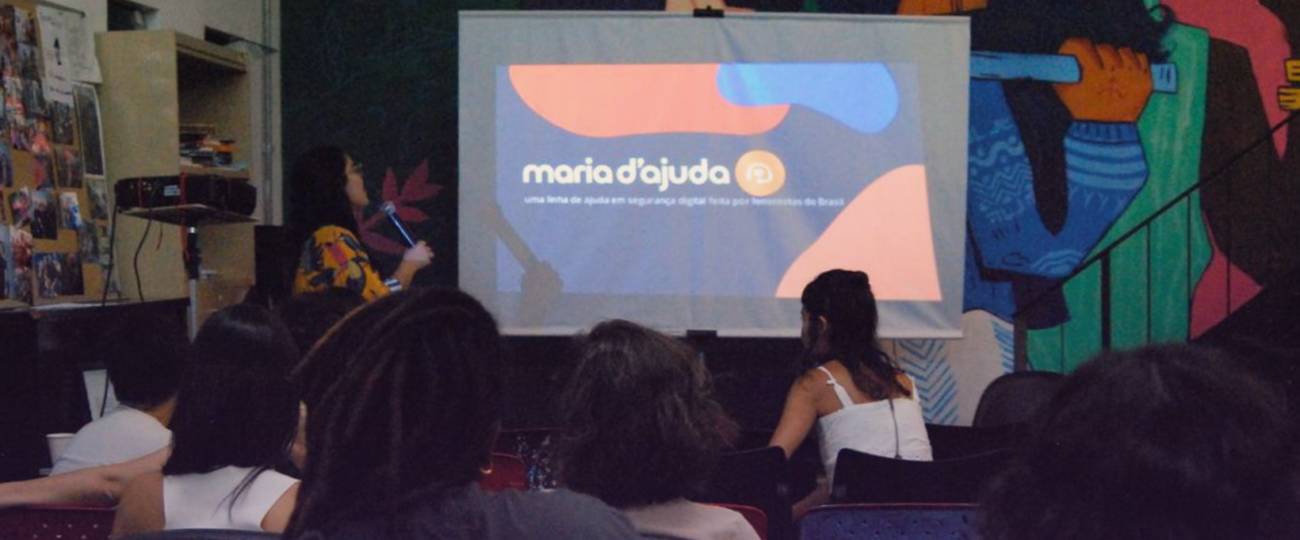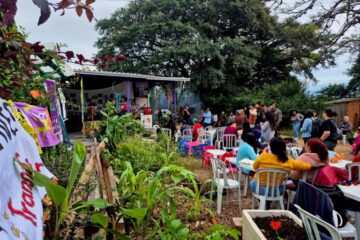In recent years, feminist organizations from around the world have been warning about the increasing number of cases of online violence against dissident bodies. We have been feeling the hostility, the humiliation, and the persecution perpetrated against women, trans people, LGBTQIAPN+ people, and organizations working to defend human rights in the digital environment. This perspecution involves both defamation of their agendas and the battle of narratives, imposing a hostile and unsafe environment.
That is where MariaLab comes into play—a feminist organization that works in the intersection of gender, race, politics, and technology, whether or not digital. At MariaLab, we promote a technical-political discussion that allows us to reconsider the use and design of technologies that may help our movements.
In recent years, MariaLab has been receiving requests to help women, civil society organizations, and people in the LGBTQIAPN+ community to handle emergency demands regarding digital security. These requests have significantly increased during and after the COVID-19 pandmic, including demands related to increasing virtualization, which has imposed new vulnerabilities in terms of security due to the lack of knowledge about how to protect ourselves in the online environment. People have been victims of scams, cloning, gender violence (including during political campaigns), and so many other forms of violence.
Getting an old project off the ground became a pressing matter: to create a help line, an online, free, and safe service so that people could count on a humanized and feminist service aiming to develop skills toward people’s autonomy. This is how Maria d’Ajuda was born, the first Brazilian feminist help line for emergency digital care, working with three pillars: social media security—specific recommendations for intake services in cases of lost access to accounts, hate-motivated attacks, harrassment, and other digital threats; organizational digital security—recommendations for damage mitigation strategies in cases of attacks against the digital infrastructure of organizations or other forms of digital threats according to different contexts; repression, persecution, and censorship—protection and care strategies in face of iminent attacks and threats against activists, social movements and human rights organizations. Other kinds of digital threats that are not listed above are analyzed on a case-by-case basis, aiming to provide the best intake service.
We were not taught that protecting ourselves online ensures a healthier use of technologies.
Maria d’Ajuda wants to change that, one case at a time. Our service is completely online, provided over email at sos@mariadajuda.org, and also includes online meetings between the care team and the person being provided the service. Care is provided through a feminist methodology that works with active listening and promotes people’s autonomy regarding their digital security. As we provide care, there is an educational process about digital care, to raise people’s confidence level when using the internet.
The Scenario of Digital Violence
Women and dissident bodies have been historically targeted by different technologies and control policies, whether through reproductive technologies; legislation that discriminates based on gender, sexuality, and race; limited access to knowledge; and many others. This is not different when it comes to developing and applying digital technologies. One example is deepfakes, artificial intelligence that combines a person’s face with another person’s body, connecting women and LGBTQIAPN+ people’s faces with the bodies of adult film actors and actress. Another example is spy apps, a surveillance technology advertising the possibility of monitoring how “faithful” a partner is, providing access to their location, camera, messages, and others. And more and more forms of control over bodies emerge, including through violence.
Some examples of digital violence strongly connected to gender, race, and sexuality regarding their targets are: non-consensual distribution of intimate images with the intention of humiliating, exposing, embarrassing someone; hate speech; electronic surveillance (or spying); extortion, that is, “threatening to leak intimate pictures to force someone to do something—whether for revenge or humiliation, or to financially extort them,” as defined by the association SaferNet; cyberbullying (or virtual harrassment); fake profiles; online persecution (cyberstalking); and censorship or control in the digital environment, which means stopping someone from having access to their digital means by changing their social media passwords, deleting their profiles, hacking into their email accounts, etc.
You Can Dive Into Digital Security and Technopolitics
Our practices at MariaLab are influenced by many formulations by the feminist and human rights movement, including the World March of Women, which has developed an amazing series about a feminist criticism of corporate power—the third episode, called “Digitalization,”offers important reflections about the political character of technology, through a grassroots feminist understanding of the impacts of mining, monitoring, and others on our territories.
We also recommend the MariaLab’s online library, dedicated to digital security for activists and other kinds of content for human rights defenders. On Maria d’Ajuda’s Instagram page, we post content about our help line and digital security that you can share with your own network. We also recommend the beautiful website Dish of the Day, by the Transfeminist Digital Care Network, which draws a parallel between digital care and food security. The website is available in Portuguese, Spanish, and English. Additionally, Simone Browne has an important article on biometric surveillance and its parallels with the colonialist surveillance carried out during slavery.
To learn more about MariaLab’s work, we recommend checking out our participation in the podcast Tecnopolítica. There are similar initiatives to our help line in other parts of the world, including Luchadoras (Mexico), Access Now (global), and Navegando Libres (Ecuador).
The work feminists conduct online is greatly affected by defamation attacks, attacks against the movement, against our main agendas, against activists. Maria d’Ajuda wants to be another arm in the feminist struggle for moments when we need each other to handle digital threats in a welcoming way that can stimulate autonomy.
The scenario is becoming ever more complex when it comes to our online work, even more so right now, when the internet is part of so many areas of our lives and a stage for an intense battle about ways of being and living. As the feminist movement knows well, we must be protected across different areas to make sure we are completely protected. Our protection must permeate a collective pact toward care and sharing knowledge among ourselves, so that it can be built consistently and endure. Every time a sister, a comrade, a collective, or organization has the initiative to become safer online, we must reflect about how becoming safer can only be achieved collectively—with the commitment of the largest number of people who are struggling during the process of cultural change in the use of technologies.
Building the internet that we want is a joint exercise of thinking and rethinking our work in it, and how it impacts the movement as a whole.
Feminists play a fundamental role in considering this new future of the internet, the pillars of which are care, affection, education, intersectional analysis, respect to the environment, multiple generations united, territories, cultures, networks between people, acceptance and support, and many more things we don’t know yet, but which we will dare to build, together.




